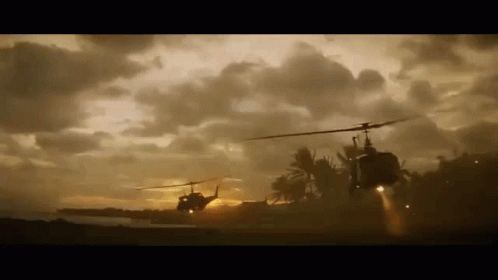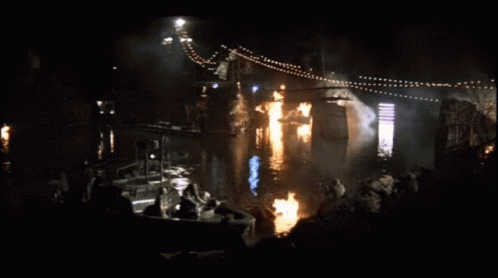Apocalypse Now (Theatrical Cut) -
This is as much of a milestone in movie history as it is in my own obsession with film. A movie that is just as compelling to watch as it is to study how Coppola and company made it, it inspired me to read Heart of Darkness, and the making-of documentary, Hearts of Darkness: A Filmmaker's Apocalypse, is one of the few documentaries I've watched more than once. I've seen many other movies about the Vietnam War since I first watched Apocalypse Now many years ago and I may choose Full Metal Jacket over it if I were forced to choose a favorite. My opinion of it having legendary status and my admiration for what it asks about the war and how it is a black mark in America's history book still stands.
This viewing made me realize that Martin Sheen doesn't get enough credit for his performance as our guide in his journey to Hell, Willard. While he looks plain and is not particularly charismatic - one critique I've read described him as a milquetoast – these traits are more strength than drawback. They let me walk in his shoes more easily, and as frightening as his drunken episode in his hotel room may be, Sheen doesn't need it to convince us how traumatized and world-weary the war has made him. Speaking of his journey, I'm a fan of stories with simple overarching plots that string varied episodes together, and I approve of this movie's, which owes as much to The Odyssey and Alice in Wonderland as it does Heart of Darkness. Each episode provides a reason why America's involvement in the war was such a blunder, my favorite being the one with Kilgore and his fight for a good place to surf. While Francois Truffaut famously said, "you can't make an effective anti-war film because war by its nature is exciting," you could point to this episode’s masterfully edited helicopter attack sequence as a counterargument. I can see how some could find it exciting, but it fills me with - for lack of a better word - horror. It's also worth calling out how good the movie looks - Storaro's cinematography being a major factor - as well as how its transition from realistic to dreamlike is expertly gradual. What's more, it's amazing how funny the movie manages to be in spite of how deathly dark it is at its core. Frederic Forrest and Sam Bottoms' very different and human reactions to the journey provide much-needed relief, as does Hopper's court jester of a photojournalist.
While I cannot rate this less than 5 stars, I still have to call out something that still doesn't sit right with me and that's Brando's performance as Kurtz. Aside from hardly having a soldier's physique - he may have let himself go after setting himself up as a God, but it's doubtful he was there long enough to end up like he does - I've always felt that Hopper, Sheen, etc. are reacting to Brando's oddities and not Kurtz's. With that said, I've thought about other actors who could have pulled it off like Kirk Douglas, Gene Hackman, etc., but I cannot think of anyone better than Brando for the role. No Hollywood actor at the time or possibly ever has the required presence and mystique to pay off what Willard's narration builds up. Besides, Brando being a product of a lifetime in Hollywood, an organization that also has plenty to hide and be ashamed of, mirrors Kurtz being a product of a lifetime in the Vietnam-era U.S. military.
Like the best art, this is a movie I react differently to and that provides something new to obsess over every time I watch it. Before this viewing, my general reaction was similar to Roger Ebert's philosophical one in his Great Movies review, but it was much more political this go-around. There are consequences to countries adopting a hypocritical, "everything is fine" response to atrocities like the Vietnam War, and the longer they deny this lesson, the longer they will start fires that those like Willard will have to extinguish. With all of the whitewashing, rebranding, whatever you want to call it that is happening in recent times, this is clearly a difficult and/or expensive lesson to learn.
This is as much of a milestone in movie history as it is in my own obsession with film. A movie that is just as compelling to watch as it is to study how Coppola and company made it, it inspired me to read Heart of Darkness, and the making-of documentary, Hearts of Darkness: A Filmmaker's Apocalypse, is one of the few documentaries I've watched more than once. I've seen many other movies about the Vietnam War since I first watched Apocalypse Now many years ago and I may choose Full Metal Jacket over it if I were forced to choose a favorite. My opinion of it having legendary status and my admiration for what it asks about the war and how it is a black mark in America's history book still stands.
This viewing made me realize that Martin Sheen doesn't get enough credit for his performance as our guide in his journey to Hell, Willard. While he looks plain and is not particularly charismatic - one critique I've read described him as a milquetoast – these traits are more strength than drawback. They let me walk in his shoes more easily, and as frightening as his drunken episode in his hotel room may be, Sheen doesn't need it to convince us how traumatized and world-weary the war has made him. Speaking of his journey, I'm a fan of stories with simple overarching plots that string varied episodes together, and I approve of this movie's, which owes as much to The Odyssey and Alice in Wonderland as it does Heart of Darkness. Each episode provides a reason why America's involvement in the war was such a blunder, my favorite being the one with Kilgore and his fight for a good place to surf. While Francois Truffaut famously said, "you can't make an effective anti-war film because war by its nature is exciting," you could point to this episode’s masterfully edited helicopter attack sequence as a counterargument. I can see how some could find it exciting, but it fills me with - for lack of a better word - horror. It's also worth calling out how good the movie looks - Storaro's cinematography being a major factor - as well as how its transition from realistic to dreamlike is expertly gradual. What's more, it's amazing how funny the movie manages to be in spite of how deathly dark it is at its core. Frederic Forrest and Sam Bottoms' very different and human reactions to the journey provide much-needed relief, as does Hopper's court jester of a photojournalist.
While I cannot rate this less than 5 stars, I still have to call out something that still doesn't sit right with me and that's Brando's performance as Kurtz. Aside from hardly having a soldier's physique - he may have let himself go after setting himself up as a God, but it's doubtful he was there long enough to end up like he does - I've always felt that Hopper, Sheen, etc. are reacting to Brando's oddities and not Kurtz's. With that said, I've thought about other actors who could have pulled it off like Kirk Douglas, Gene Hackman, etc., but I cannot think of anyone better than Brando for the role. No Hollywood actor at the time or possibly ever has the required presence and mystique to pay off what Willard's narration builds up. Besides, Brando being a product of a lifetime in Hollywood, an organization that also has plenty to hide and be ashamed of, mirrors Kurtz being a product of a lifetime in the Vietnam-era U.S. military.
Like the best art, this is a movie I react differently to and that provides something new to obsess over every time I watch it. Before this viewing, my general reaction was similar to Roger Ebert's philosophical one in his Great Movies review, but it was much more political this go-around. There are consequences to countries adopting a hypocritical, "everything is fine" response to atrocities like the Vietnam War, and the longer they deny this lesson, the longer they will start fires that those like Willard will have to extinguish. With all of the whitewashing, rebranding, whatever you want to call it that is happening in recent times, this is clearly a difficult and/or expensive lesson to learn.
Last edited by Torgo; 02-25-22 at 11:16 AM.

 What is a colonist? (in regards to the film). I thought he was a college professor who taught archeology.
What is a colonist? (in regards to the film). I thought he was a college professor who taught archeology.
 Hope all goes well.
Hope all goes well.



